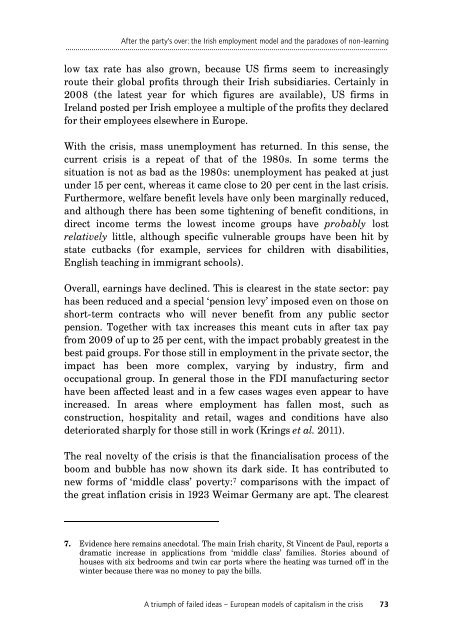A triumph of failed ideas European models of capitalism in ... - Journal
A triumph of failed ideas European models of capitalism in ... - Journal
A triumph of failed ideas European models of capitalism in ... - Journal
You also want an ePaper? Increase the reach of your titles
YUMPU automatically turns print PDFs into web optimized ePapers that Google loves.
After the party’s over: the Irish employment model and the paradoxes <strong>of</strong> non-learn<strong>in</strong>g.................................................................................................................................................................low tax rate has also grown, because US firms seem to <strong>in</strong>creas<strong>in</strong>glyroute their global pr<strong>of</strong>its through their Irish subsidiaries. Certa<strong>in</strong>ly <strong>in</strong>2008 (the latest year for which figures are available), US firms <strong>in</strong>Ireland posted per Irish employee a multiple <strong>of</strong> the pr<strong>of</strong>its they declaredfor their employees elsewhere <strong>in</strong> Europe.With the crisis, mass unemployment has returned. In this sense, thecurrent crisis is a repeat <strong>of</strong> that <strong>of</strong> the 1980s. In some terms thesituation is not as bad as the 1980s: unemployment has peaked at justunder 15 per cent, whereas it came close to 20 per cent <strong>in</strong> the last crisis.Furthermore, welfare benefit levels have only been marg<strong>in</strong>ally reduced,and although there has been some tighten<strong>in</strong>g <strong>of</strong> benefit conditions, <strong>in</strong>direct <strong>in</strong>come terms the lowest <strong>in</strong>come groups have probably lostrelatively little, although specific vulnerable groups have been hit bystate cutbacks (for example, services for children with disabilities,English teach<strong>in</strong>g <strong>in</strong> immigrant schools).Overall, earn<strong>in</strong>gs have decl<strong>in</strong>ed. This is clearest <strong>in</strong> the state sector: payhas been reduced and a special ‘pension levy’ imposed even on those onshort-term contracts who will never benefit from any public sectorpension. Together with tax <strong>in</strong>creases this meant cuts <strong>in</strong> after tax payfrom 2009 <strong>of</strong> up to 25 per cent, with the impact probably greatest <strong>in</strong> thebest paid groups. For those still <strong>in</strong> employment <strong>in</strong> the private sector, theimpact has been more complex, vary<strong>in</strong>g by <strong>in</strong>dustry, firm andoccupational group. In general those <strong>in</strong> the FDI manufactur<strong>in</strong>g sectorhave been affected least and <strong>in</strong> a few cases wages even appear to have<strong>in</strong>creased. In areas where employment has fallen most, such asconstruction, hospitality and retail, wages and conditions have alsodeteriorated sharply for those still <strong>in</strong> work (Kr<strong>in</strong>gs et al. 2011).The real novelty <strong>of</strong> the crisis is that the f<strong>in</strong>ancialisation process <strong>of</strong> theboom and bubble has now shown its dark side. It has contributed tonew forms <strong>of</strong> ‘middle class’ poverty: 7 comparisons with the impact <strong>of</strong>the great <strong>in</strong>flation crisis <strong>in</strong> 1923 Weimar Germany are apt. The clearest7. Evidence here rema<strong>in</strong>s anecdotal. The ma<strong>in</strong> Irish charity, St V<strong>in</strong>cent de Paul, reports adramatic <strong>in</strong>crease <strong>in</strong> applications from ‘middle class’ families. Stories abound <strong>of</strong>houses with six bedrooms and tw<strong>in</strong> car ports where the heat<strong>in</strong>g was turned <strong>of</strong>f <strong>in</strong> thew<strong>in</strong>ter because there was no money to pay the bills.A <strong>triumph</strong> <strong>of</strong> <strong>failed</strong> <strong>ideas</strong> – <strong>European</strong> <strong>models</strong> <strong>of</strong> <strong>capitalism</strong> <strong>in</strong> the crisis 73








